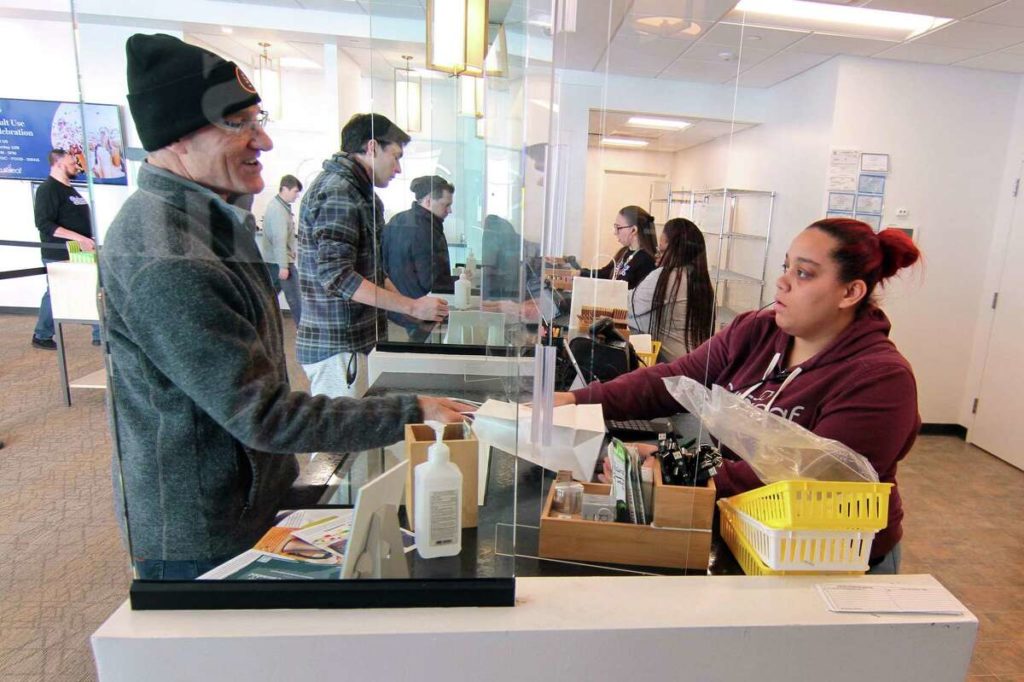Customer Mark MacIntyre, left, purchases items during a celebration of the start of adult-use marijuana sales at Curaleaf Stamford in Stamford, Conn., on Saturday Jan. 28, 2023.
BRIDGEPORT — Monday’s zoning commission meeting proved to be a good night for legalized pot in Bridgeport, where wary officials only recently decided to welcome the new recreational cannabis industry after years of keeping medical marijuana establishments at bay.
Not only did the zoning commission rebuff an effort to tighten the six-month-old regulations for recreational cannabis sales, but members approved a previously rejected application for the city’s second dispensary.
The veteran land-use attorney was trying to appeal to those on the board and in the audience who still oppose state lawmakers’ decision in 2021 to allow the retail sale of cannabis nine years after first authorizing marijuana sales for medicinal purposes.
Commission members last fall shot down 1201 Bridgeport Properties’ then-solely recreational proposal over some community opposition and concerns about traffic and parking. But Willinger on Monday came prepared to successfully rebuff all of the prior stated reasons for denial.
He passed out a petition containing the signatures of 281 residents in favor of the application and claimed his client had met with several neighborhood leaders and won them over.
“The majority of this community now supports this proposal,” Willinger said.
Willinger also emphasized how tightly controlled and secure the product and the store will be, noting the product would be kept in “a vault like a bank” and, when purchased, cannot be opened on premises. He said most clients would place orders by phone for pick-up.
“The average time anyone is in that store will be about five minutes,” he said.
Willinger also said 1201 Bridgeport Properties had provided additional parking in its updated plan and leased more of the Dewey Street building. That additional square footage, Willinger said, will remain vacant until his client chooses to sub-lease it to a tenant that will not conflict with its business or have an adverse impact on the neighborhood.
“That is a significant and real costly change, but we want to do it for ourself, you and the neighborhood,” Willinger told the zoning commission.
Ultimately, board members approved the application in a 5 to 1 vote. The Dewey Street business is the second dispensary that has so far been approved in Bridgeport, with the first planning to open in the spring within a new shopping plaza at 1234 Huntington Turnpike on the border with Trumbull.
Russell Liskov, the municipal attorney who advises the zoning commission, on Tuesday said Willinger had ticked all of the right boxes in the revised application.
“Even if the board has trepidations about marijuana, it’s a permitted use,” Liskov said.
The bigger victory Monday for recreational cannabis advocates was the zoning board’s similar 5 to 1 vote against an effort by colleague Bob Filotei to toughen up the site regulations for cannabis shops which that same body passed late last July.
Under those rules, a recreational pot store cannot open within 750 feet of a school.
Filotei wanted to expand that requirement to other so-called sensitive uses that are currently applied to applications for liquor stores and/or strip clubs/adult entertainment: hospitals, day care centers, recreation facilities, public playgrounds and parks, libraries, and any type of drug/alcohol recovery/treatment facility.
William Coleman, the city’s deputy director of planning and economic development, argued against the amendment. He and his staff drafted the rules approved last summer and on Tuesday displayed maps showing how many areas of town would no longer be able to host a marijuana retailer were the changes to go through.
“The industry is one we’re trying to welcome to the city,” Coleman said, referring to the section of Connecticut’s 2021 law allowing the levying of a 3 percent municipal tax on gross retail sales. “It’s the first time this city will have a revenue stream besides property taxes.”
Zoning Commission Chairman Mel Riley asked Coleman why he would be opposed to cannabis and liquor having the same regulations.
“It’s a much more highly-regulated industry,” Coleman said of the state’s cannabis rules. “Liquor is looser.”
He later said, “You can’t think of it as someone’s dealing cannabis on the street.”
And, Coleman noted, under the local zoning regulations the board passed last July, members still have “broad discretion” to question and approve or reject retail applications, as had been the initial case with the one for 15 Dewey St.
“My request, respectfully, for the commission is work with the regulations you’ve adopted,” Coleman successfully urged.
Filotei on Tuesday said he believes he is on the right side of the issue and that the general public just is not yet paying enough attention to it.
“People are not showing up at the (zoning) hearings like they should,” he said. “I don’t think they’re aware of it (retail marijuana) until it shows up in their backyard.”
“I’m not done with it,” Filotei said. “I’ll try to figure out another way to get the thing (zoning regulation) adjusted so it makes a little more sense.”
Resident Andrew Allen on Monday spoke in favor of Bridgeport continuing ahead with embracing the recreational cannabis industry. Referring to critics’ concerns and claims, Allen told the zoning board that he is reminded of a famous 1930s film dramatizing high school students becoming addicted to cannabis.
“It’s really ‘Reefer Madness’-era stuff,” Allen said. “It’s not a bunch of criminals (selling/buying the product).”
H/T: www.ctpost.com



